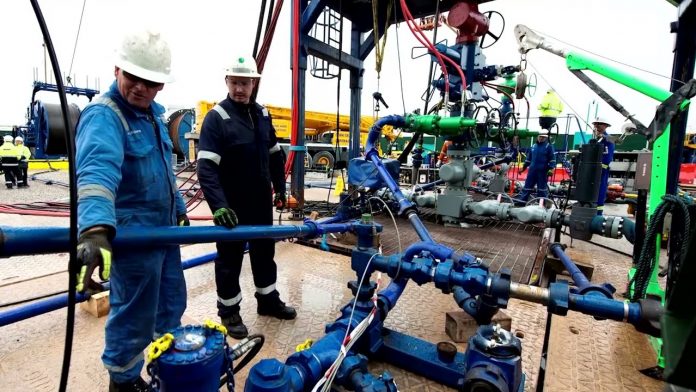Protesters set up a fake gas fracking platform in front of both houses of the British Parliament in 2012
London (AFP) – Britain on Thursday lifted England’s controversial gas fracking moratorium to boost energy security, despite a breach of the ruling Conservative Party’s pledge in the statement.
Prime Minister Liz Truss halted the move two weeks ago, shortly after taking office, in a massive deal addressing turmoil in energy markets after Russia, a major gas supplier, invaded Ukraine.
The UK called in 2019 for a halt to hydraulic fracturing – or hydraulic fracturing, which is used to release hydrocarbons trapped deep in the earth – over concerns it could cause earthquakes.
The freeze was imposed under Truss predecessor Boris Johnson in the wake of a series of earthquakes, but the government changed course after Russia cut gas supplies to most of Europe, driving up prices.
– energy security –
“In light of Putin’s illegal invasion of Ukraine and energy weaponisation, strengthening our energy security is an absolute priority,” Business and Energy Minister Jacob Rees-Mogg said in a government statement.
He reaffirmed Truss’ goal of making Britain a net exporter of energy by 2040.
“To get there, we’ll need to explore all the avenues available to us through solar, wind, oil and gas production – so it’s right that we raised the pause to realize any potential sources of domestic gas.”
The Department of Business, Energy and Industrial Strategy (BEIS) has confirmed a new oil and gas licensing round next month for 100 new licenses, but only with the support of local communities.
However, the announcement caused an uproar in Parliament because it broke a Conservative promise in the 2019 general election manifesto.
Opposition and Conservative lawmakers representing constituencies in northern England – where the tremors were felt in 2011 – were battered.
– ‘Earthquake charter’ –
The opposition Labor Party described the new policy as an “earthquake charter”.
Business Climate spokesperson Ed Miliband questioned Reese-Mogg about where the evidence for the decision is.
“The 2019 manifesto that he and every member of the corresponding party stood on said this ‘we will not support hydraulic fracturing unless the science shows conclusively that it can be done safely,'” Miliband told Parliament.
“They lift the ban, but they can’t provide evidence.”
Liberal Democrat environmental spokeswoman Wera Hobhouse added that people in the excavation areas are being treated like guinea pigs.
“Conservatives’ obsession with fracking reveals that they don’t actually believe climate change is happening and they aren’t ready to take urgent action,” Hobhouse said.
“If people suffer from water pollution and serious earthquakes, this decision will be unforgivable.”
– ‘He turned out to be safe’ –
Reese-Mogg replied that hydraulic fracturing is “safer” and greener than outside energy sources.
“Using our fuel sources is more environmentally friendly rather than extracting it from other countries and bringing it here at a high cost, both financially and in terms of carbon,” he said.
“It’s safe. He insisted it was proven safe.
He added that the policy would “bring us cheaper energy” at a time when prices are skyrocketing.
Fracking is done by blasting a mixture of water, sand and chemicals underground to release shale oil and gas.
But ecologists argue that the process pollutes water supplies, harms wildlife, causes earthquakes and contributes to global climate change.
Green lobbies criticized Thursday’s decision.
“Tear apart the rules that protect people from hydraulic fracturing would send shock waves through local communities,” said Danny Gross, an activist with Friends of the Earth.
“If the government gets into the hydraulic fracturing industry and allows them to cause bigger earthquakes, it will further undermine confidence that fracking can be done safely.”
BEIS has also published the British Geological Survey’s scientific review of shale gas extraction.
The government study added that the review highlighted “limited current understanding” of UK geology and onshore shale resources “should be a reason to drill more wells to gather more evidence and data”.





























